2022年中考英语一轮复习牛津译林版七年级下册Units3-4课件(共有PPT49张)
文档属性
| 名称 | 2022年中考英语一轮复习牛津译林版七年级下册Units3-4课件(共有PPT49张) | 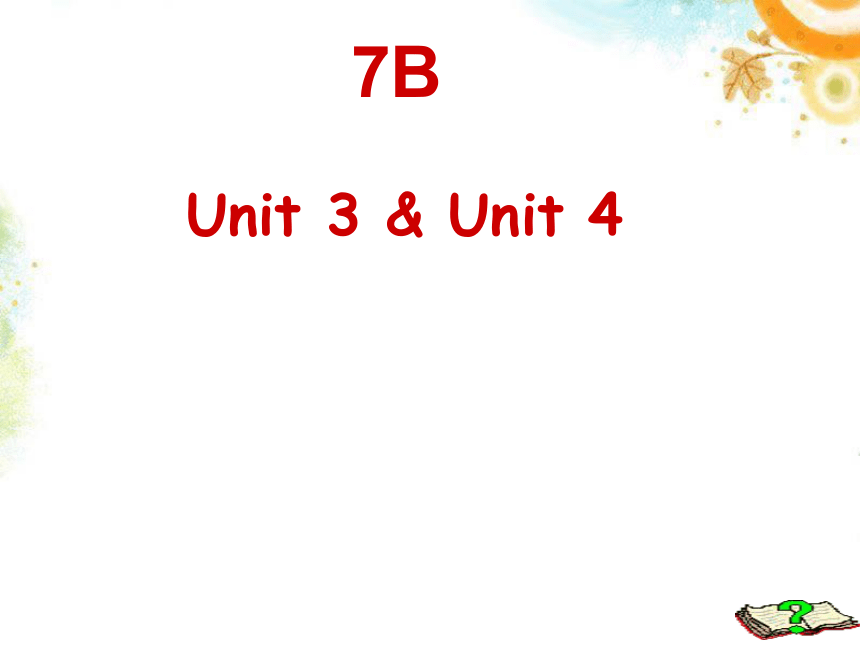 | |
| 格式 | pptx | ||
| 文件大小 | 334.8KB | ||
| 资源类型 | 教案 | ||
| 版本资源 | 牛津译林版 | ||
| 科目 | 英语 | ||
| 更新时间 | 2022-05-05 14:42:39 | ||
图片预览

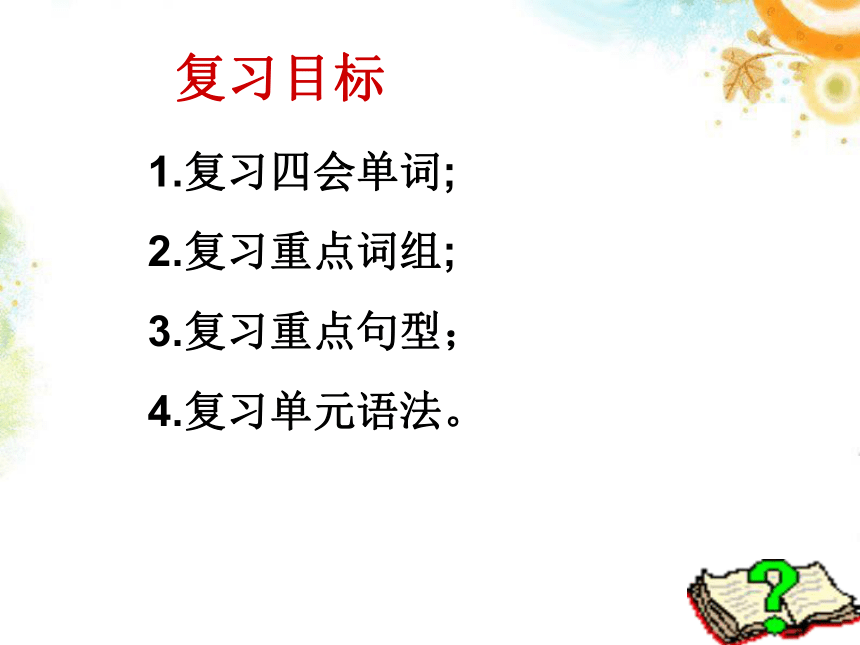
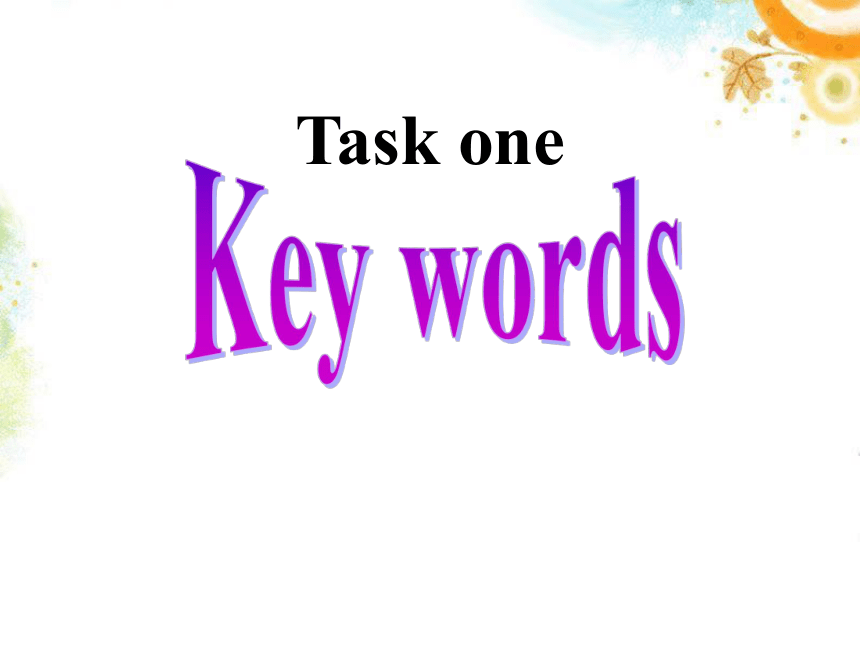
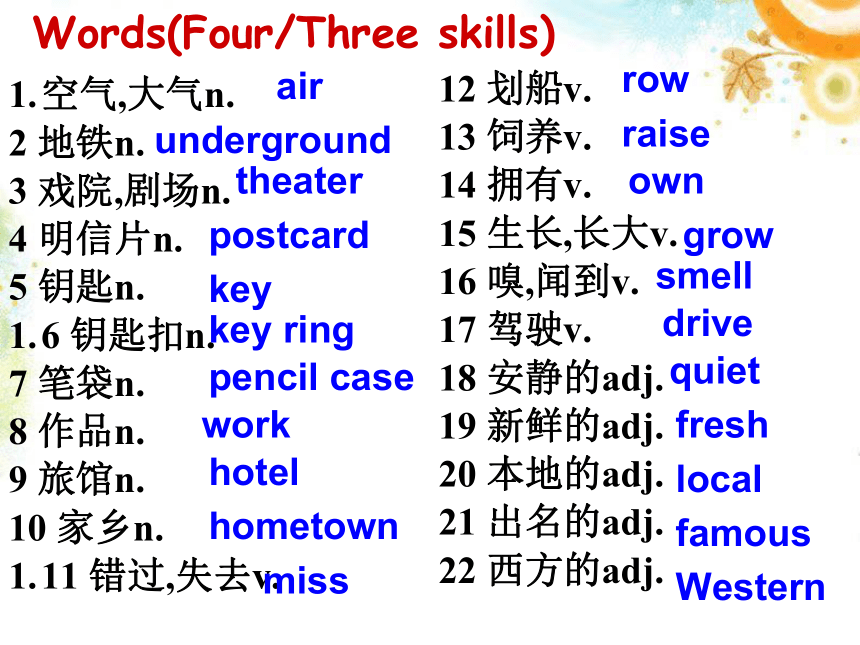
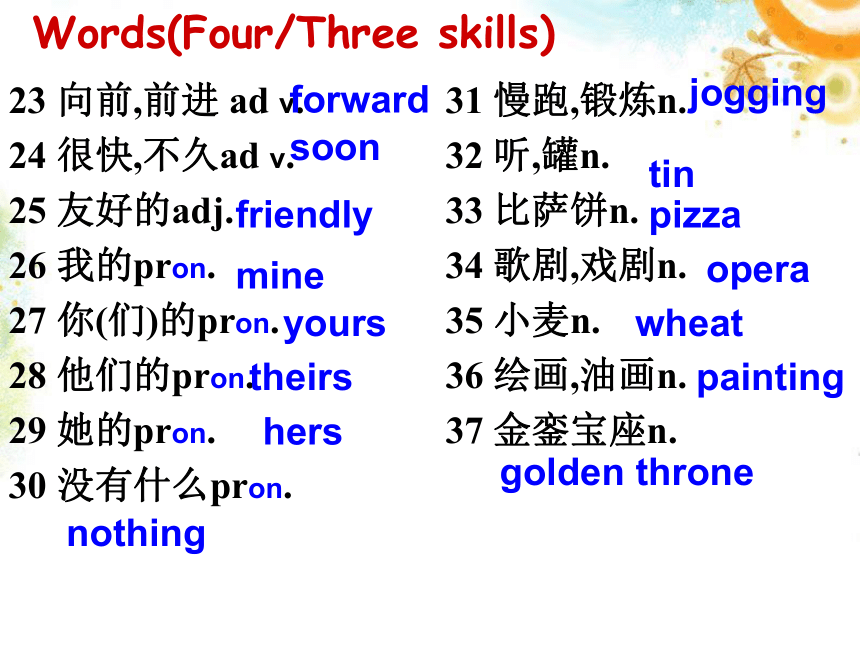
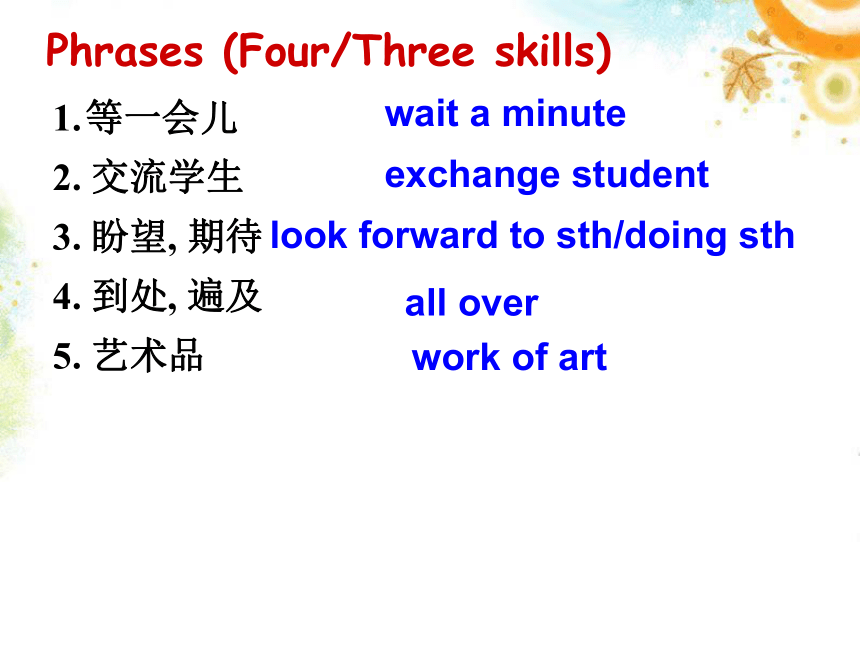
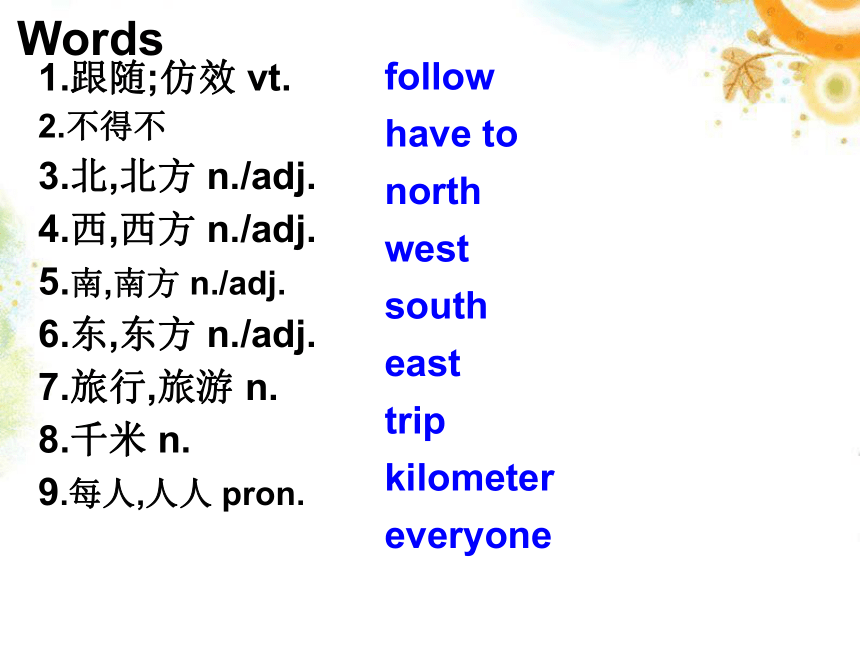
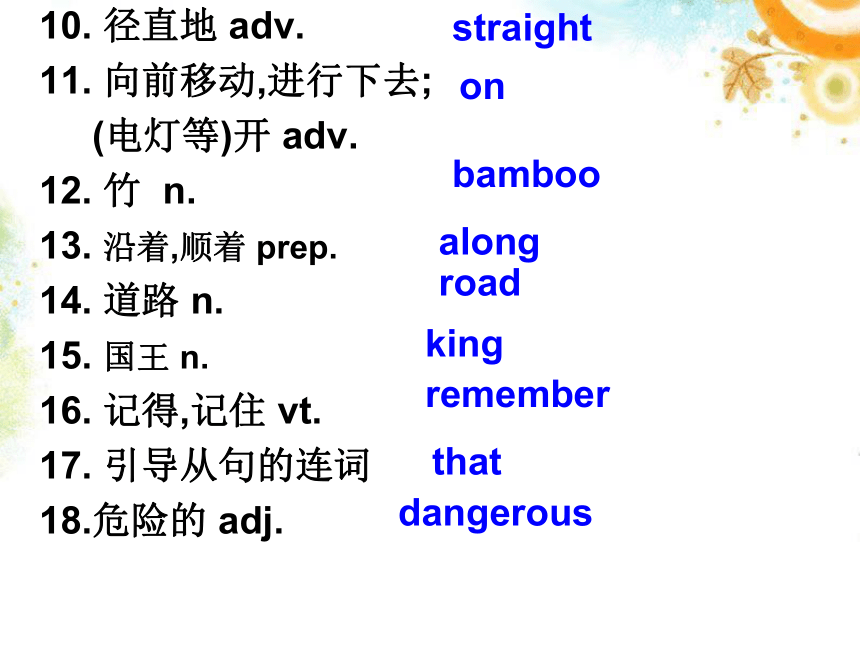

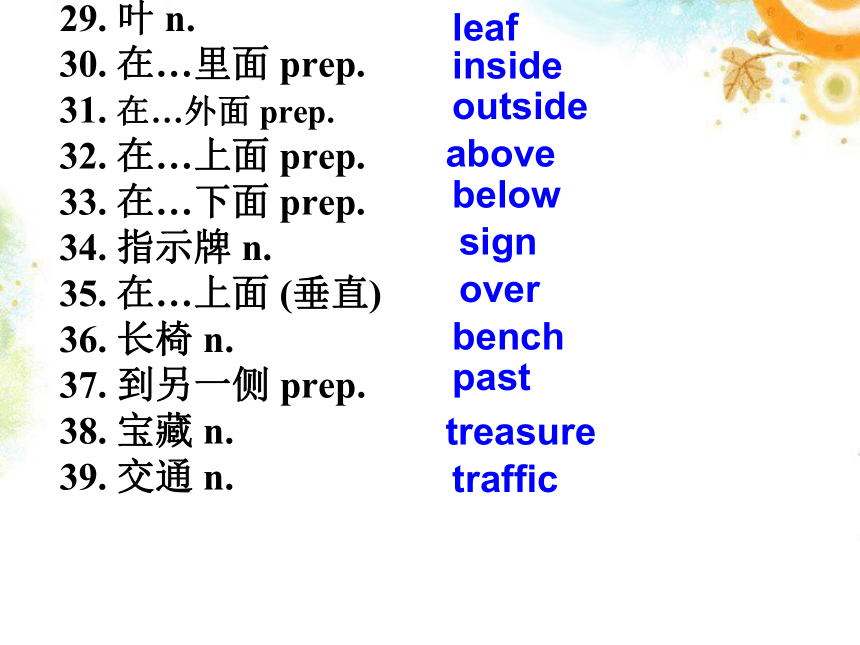
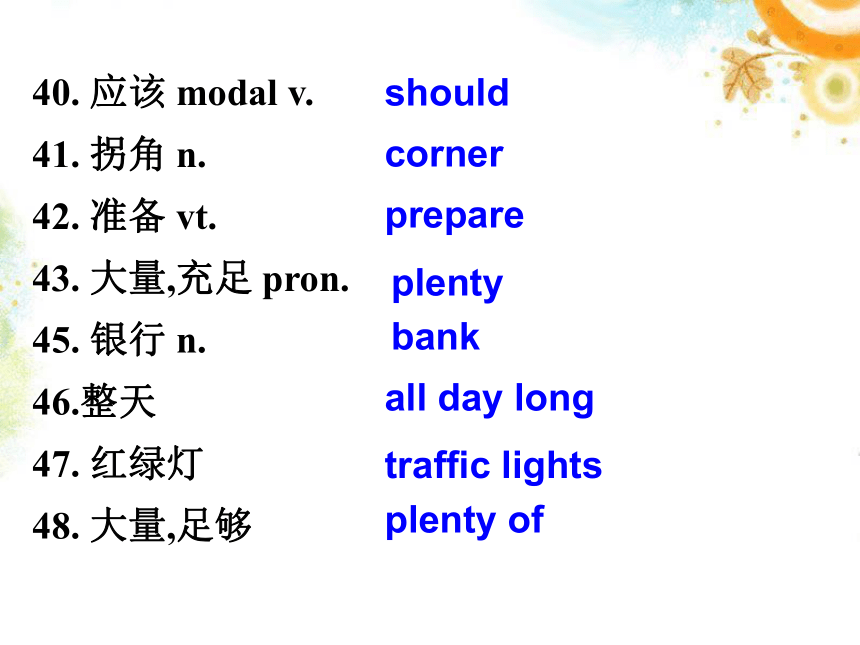
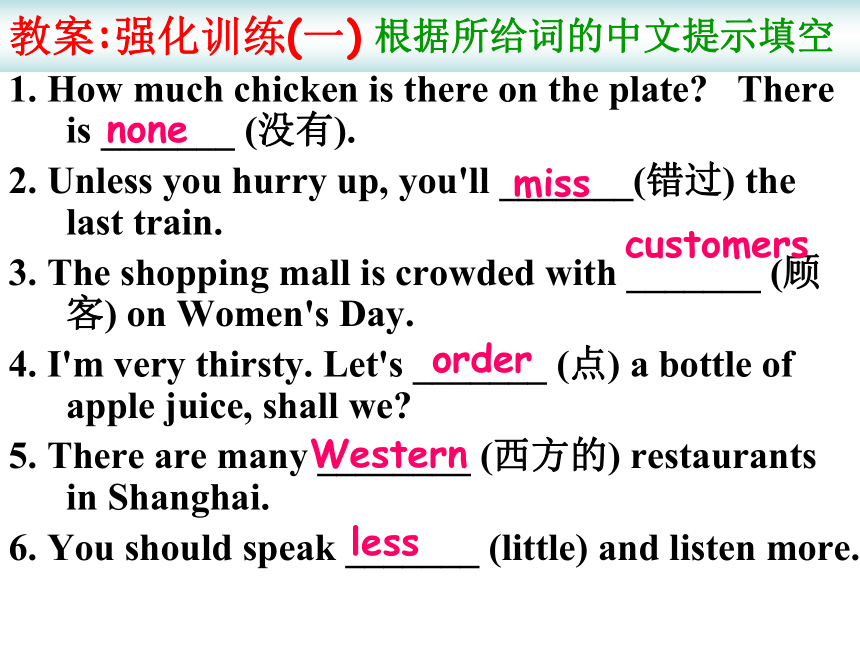
文档简介
(共49张PPT)
Unit 3 & Unit 4
7B
复习目标
1.复习四会单词;
2.复习重点词组;
3.复习重点句型;
4.复习单元语法。
Task one
Key words
12 划船v.
13 饲养v.
14 拥有v.
15 生长,长大v.
16 嗅,闻到v.
17 驾驶v.
18 安静的adj.
19 新鲜的adj.
20 本地的adj.
21 出名的adj.
22 西方的adj.
空气,大气n.
2 地铁n.
3 戏院,剧场n.
4 明信片n.
5 钥匙n.
6 钥匙扣n.
7 笔袋n.
8 作品n.
9 旅馆n.
10 家乡n.
11 错过,失去v.
Words(Four/Three skills)
air
underground
theater
postcard
key
key ring
pencil case
work
hotel
hometown
miss
row
raise
own
grow
smell
drive
quiet
fresh
local
Western
famous
31 慢跑,锻炼n.
32 听,罐n.
33 比萨饼n.
34 歌剧,戏剧n.
35 小麦n.
36 绘画,油画n.
37 金銮宝座n.
23 向前,前进 ad v.
24 很快,不久ad v.
25 友好的adj.
26 我的pron.
27 你(们)的pron.
28 他们的pron.
29 她的pron.
30 没有什么pron.
Words(Four/Three skills)
forward
soon
friendly
mine
yours
theirs
hers
nothing
jogging
tin
pizza
opera
wheat
painting
golden throne
等一会儿
2. 交流学生
3. 盼望, 期待
4. 到处, 遍及
5. 艺术品
Phrases (Four/Three skills)
wait a minute
exchange student
look forward to sth/doing sth
all over
work of art
Words
1.跟随;仿效 vt.
2.不得不
3.北,北方 n./adj.
4.西,西方 n./adj.
5.南,南方 n./adj.
6.东,东方 n./adj.
7.旅行,旅游 n.
8.千米 n.
9.每人,人人 pron.
follow
have to
north
west
south
east
trip
kilometer
everyone
10. 径直地 adv.
11. 向前移动,进行下去;
(电灯等)开 adv.
12. 竹 n.
13. 沿着,顺着 prep.
14. 道路 n.
15. 国王 n.
16. 记得,记住 vt.
17. 引导从句的连词
18.危险的 adj.
straight
on
bamboo
along
road
king
remember
that
dangerous
19. 声音 n.
20. 森林 n.
21. 滑稽的 adj.
22. 大笑 vi.
23.长颈鹿 n.
24. 相当,非常 adv.
25. 脖子 n.
26. 东北方 n./adj./adv.
27. 穿过,横过 vt.
28. 在…对面;穿过,横过 prep.
sound
forest
funny
laugh
giraffe
quite
neck
north-west
cross
across
29. 叶 n.
30. 在…里面 prep.
31. 在…外面 prep.
32. 在…上面 prep.
33. 在…下面 prep.
34. 指示牌 n.
35. 在…上面 (垂直)
36. 长椅 n.
37. 到另一侧 prep.
38. 宝藏 n.
39. 交通 n.
leaf
inside
outside
above
below
sign
over
bench
treasure
past
traffic
40. 应该 modal v.
41. 拐角 n.
42. 准备 vt.
43. 大量,充足 pron.
45. 银行 n.
46.整天
47. 红绿灯
48. 大量,足够
should
corner
prepare
plenty
bank
all day long
traffic lights
plenty of
1. How much chicken is there on the plate There is _______ (没有).
2. Unless you hurry up, you'll _______(错过) the last train.
3. The shopping mall is crowded with _______ (顾客) on Women's Day.
4. I'm very thirsty. Let's _______ (点) a bottle of apple juice, shall we
5. There are many ________ (西方的) restaurants in Shanghai.
6. You should speak _______ (little) and listen more.
教案:强化训练(一)
none
根据所给词的中文提示填空
miss
customers
order
Western
less
用所给动词的适当形式填空。
1. Some animals are___________(危险的 ) in the_______ (森林).
2. Which animals have long________ (脖子)
3. Before ________ (穿过) the road, you must make sure there are no cars coming.
4. ___________ (记得) to buy some gifts for your mother on her birthday.
5. ___________(每人) is playing football outside. Can I join them, Mum
6. Go _________ (径直) home.
7. The school is to the__________ (东北) of the shopping mall.
dangerous
forest
necks
crossing
Remember
Everyone
straight
north-west
8. Can you see the wooden _________ (桥) over the river
9. There are strange ________ (声音) coming from the next room.
10. There’s something __________ (好笑的) going on here.
11. Pandas like eating __________ (竹子) shoots and ________(叶子).
12. His children like him very much. Because he always makes them ________(笑).
13. The food is ________(在…上面) the drinks.
14. The drinks are________(在…下面)the food.
bridge
sounds
funny
bamboo
leaves
laugh
above
below
15. Where is the _________(宝藏) I want to find it.
16. Half an hour _______(以后),he sees his mother in the office.
17. He enjoys________(躺)on the grass.
18. What can you see _________(在…对面) the bridge
19. Are the lions in an _________(开着的)area
20.Walk________(路过)the post office, turn left and you will find the supermarket.
21. There is an English _________(角落) in our classroom.
22. Turn left at the first __________(交叉路口).
treasure
later
lying
across
open
past
Corner
crossing
23. There is much__________(车辆) on the road.
24. Take the second __________(转弯处)on the right.
25. Which bus__________(应该) I take to the shopping mall
26. Walk _______(经过)the post office ,and you will see the bookshop.
27. Go ________(cross) the road at the zebra _________(cross).
traffic
turning
should
past
across
crossing
1.none / no one/ nothing
(1)---How many students has been in the classroom ---__________.
(2)_______ of them _____________(speak) English.
(3)----Who’s in the classroom ----______________.
(4)----What’s in the box ----________________.
(教案:单词辨析)
none
None
No one
speak/speaks
Nothing
2. smell (v.&n.) 用作动词,“嗅,闻到”,接名词或代词作宾语。作系动词,“闻起来”,后接形容词作表语。
(1) The camels can ___________ water far away.
(2) These roses smell__________(good). I’d like to buy some.
(3) The wolves has good eyesight, _________ and hearing.
(教案:单词辨析)
smell
good
smell
3. quiet (adj.), quite(adv.), silent(adj.)
(1) Please keep _________. Your father is sleeping.
(2) I don’t_________ understand this maths problem.
(3) The gunshot broke the __________
evening.
(教案:单词辨析)
quiet
quite
silent
4.miss (v.)错过,失去 miss sb.
miss doing sth.
(1)Be quick, or you’ll __________the train.
(2)She_________her parents very much while she was in the USA last year.
(3) Liu Hao often says “To us, a ________ is as good as a mile.”
(教案:单词辨析)
miss
missed
miss
5. order
(1)---May I have your __________, sir ---OK, two cups of coffee, please.
(2)It's very popular __________ things on the Internet.
(3)He gets up early in ________to catch the first bus.
(4)Please put the following things in ____________.
(教案:单词辨析)
order
to order
order
order
单词辨析
6. I __________ go home now because it is getting dark.
I ________ finish my work on time in order to be a good student.
She has to do all the homework, ______ she
You _________(禁止) put your bike here.
--Will Lucy come to the party –She _____ come. But I am not sure.
--Is the girl under the tree Nancy –No, it _____ be Lucy. She has gone to Japan.
The book _____ be Daniel’s, for his name is on the cover.
have to
must
doesn’t
mustn’t
may
can’t
must
2. remember (v.) 意为“记住”,remember+that…;
remember to do sth. 记住要做某事;remember doing sth 记得做过某事
Remember that you are a student.
Remember _________(close) the door when you leave.
Don’t remember ______ (make) the same mistake before
to close
making
3. dangerous (adj.) 意为“危险的”
danger (n.)危险,be in danger处于危险中,
be out of danger 脱离危险
Don’t play in the street. It’s very _________.
Now my grandfather is out of ______(dangerous).
The fireman rushed into the fire and took the child to _______(safe).
The plane landed _______(safe) at the airport.
Do you think online shopping is much ______(safe) than window shopping
dangerous
danger
safety
safely
safer
4. past (prep.)经过
When I walked _____(路过) his home, I saw him _______(read) books in his study.
When I ________(路过) his house, I saw him _______(read) books in his study.
Now it’s half _____ seven. It’s time for school.
(n.) in the past在过去,反义:at present 现在
In the past, my father _____(go) work by bike.
(adj.) He _________(make) a number of foreign friends in the past ten years.
reading
passed
reading
went
has made
past
past
5. across prep. “在……对面;穿过,横过”,
cross v. “穿过,横过”
What can you see _____________ the bridge
________ the bridge, and you will see the elephants.
through prep. 穿过, 贯穿, 通过
_________ books, we can learn a lot about the world.
The moon shines in _________ the window.
These animals’ special surviving skills helped them live ______ hard times.
across/opposite
Cross
Through
through
through
1. 我的一个老朋友
2. 冰箱里什么也没有
3. 带这些交换生去影院
4 邀请他们和我们吃晚餐
5. 盼望尽快见到你
an old friend of mine
there’s nothing in the fridge
invite them to have dinner with us
look forward to meeting you soon
take the exchange students to the cinema
Task2: Phrases
6.离北京市中心不远
7. 许多艺术品可看
8.以中国画而闻名
9. 学所有关于中国的历史
10.在湖上划船
11.带你参观我的家乡
12.在你所住的附近地方
not far from the center of Beijing
have many works of art to see
be famous for Chinese paintings
learn all about China’s history
row a boat on the lake
show you around my hometown
in the area near where you live
Translate into English
13. 跟随某人做某事
14.确信做某事
15. 去动物园的旅行
16. 直走下去
17. 发出美妙的声音
18. 过桥
19. 打开扇子
follow sb. to do sth.
be sure to do sth.
a trip to the zoo
go straight on
make beautiful sounds
cross the bridge
open fans
20. 整天地
21. 躺下
22. 跳来跳去
23. 使某人做某事
24. 为……准备
25. 大量的;足够的
all day long
lie down
jump around
make sb do sth
prepare…for…
plenty of
Task 3
Important sentences
1、从北京市中心坐地铁到那儿只需四十分钟。
It's only __________________
___________________by underground.
用spend,take ,cost或pay 填空:
(1)It is not wise __________ your money on junk food.
(2)I haven’t ___________ for the book yet.
(3)Grandmother___________ half an hour exercising in the park every morning.
(4)It ________ me thirty more minutes to work this morning as the fog was so thick.
(5)It __________ me more to live in the city.
forty minutes from the center of Beijing to there
spends
to spend
paid
took
costs
2.当地的人们喜欢在早晨在公园里慢跑。
Local people like ______________ in the park.
3. 你能在那儿为你的家人买到精美的礼物。
You can buy___________________
__________________ there.
4.如果你不喜欢中餐,也有一些西餐厅。
If you don’t like _______________, there are some _________________ too.
like jogging
wonderful presents for your family and friends
Chinese food
Western restaurants
5. 从酒店到北海公园多远? 乘公交车大约40分钟.
______________ is it from the hotel to Beihai Park It’s about_______________.
(2014.连云港) ---__________ wiil the fog and haze last
---I’ve no idea. There’s no sign of an end.
A. How soon B. How far C. How long D. How often
(2014.无锡)---___________ is the World Cup held ---Every four years.
A. How far B. How long C. How soon D. How often
How far
forty minutes by bus
C
D
6. 我认为这是一个居住的好地方。
I think it’s a________________________________.
7. 一些家庭养牛,另一些家庭种植小麦。
Some _________________, and ____________________________________.
raise:vt. 饲养;升高 有被动语态,直接可加宾语。
raise one’s hand, raise the voice, watch the raising of the national flag,
The prices of the houses _______________(raise) a lot over these years.
Prices ___________(rise) all the time.
good place to live
families raise cows
have been raised
are rising
others grow wheat
8.通常我的妈妈开车带我们去那儿购物。
Usually my mother
____________________________________.
9. 我能闻到花香,听到鸟唱歌。
I can _____________________ and __________________________.
drives us there to do the shopping
smell the flowers
hear the birds sing
10. Sunshine Park is east of Lake Park.
“A在B的东、西、南、北面”用句型
“A is east / west / south / north of B.”
=“A is to the east / west / south / north of B.”
Nanjing is west of Shanghai.
= Nanjing is _____________ Shanghai.
to the west of
11. Look! Here is the panda! 倒装句
Look! Here ______(come) the bus. Take out your _______(零钱).
12. 在第三个拐弯处左拐。
__________________________________
__________________________________
Take the+序数词+turning on the right / left.
Turn right / left at the+序数词+turning.
comes
change
Take the third turning on the left.
= Turn left at the third turning.
13. Go straight on, and you’ll find the Panda House.直走,你们就会看到熊猫。
祈使句, and+陈述句.
and连接的两句是一种顺承关系。
前一分句表示一种条件或假设,后一分句表示一种结果或推论。
Stand over there, _____ you can see it better.
Take the medicine three times a day, ___ you won’t get well soon.
and
or
14. They like to eat bamboo and lie down all day long.它们喜欢吃竹子,而且成天躺在那儿。
long adv. 用在一段时间之后,起强调作用。
They work hard___________. 他们长年辛勤工作。
15. How do I get there 去那儿的路怎么走?
常用问路方法:Excuse me, where is…
Can you tell me the way to…
Which is the way to…
Can you tell/show me how to get to…
all year long
16. The flowers are in front of the shop.
花在商店的前面。
in front of 指某物外部的前面,其反义behind
in the front of 在某物内部的前面,其反义at the back of
There is a big tree _____________ our school gate.(在……的前面)
Mr Wu is standing _____________(在……的前部) the classroom.
in front of
in the front of
17.为什么不参观我们当地的剧院欣赏京剧呢?
________________________
and____________________
提建议的句式:
Why not do sth
Why don’t you do sth
What /How about doing sth
Shall we do sth
Let’s do sth.
Perhaps we should do sth.
Why not visit our local theater
enjoy Beijing opera
Task 5
Grammar land
名词所有格:
1. 单数名词词尾加“ ’s”,复数名词词尾没有s,也要加“ ’s”。
__________ 男孩的书包 ___________ 男厕所
2. 若名词已有复数词尾又是s ,只加“’”。
________________ 工人的斗争
3. 凡不能加“’s”的名词,都可以用“名词+of +名词”的结构来表示所有关系。
________________ 歌的名字
4. 如果两个名词并列,并且分别有’s,则表示“分别有”;只有一个’s,则表示“共有”。
John’s and Mary’s rooms (两间) John and Mary’s room (一间)
the boy’s bag
men’s room
the workers’ struggle
the name of the song
5. 作为一个整体的词组,一般在最后一个词的词尾加’s。
步行一个半小时的路程
_________________________
6. 不定代词后接else , 所有格放在else上。 其他某人的包_________________
7. an old friend of my father’s==
one of my father’s old friends
8. 起修饰作用的名词,如不表示所有关系,通常不用’s.
volunteer doctor, apple tree,
one and a half hours’ walk
someone else’s bag
1. 冠词:不定冠词 a (an),常用来泛指某人或某物;定冠词the,常用来指特定的某人或某物。
重点掌握the的情况:
(1)特指名词前Tokyo is the capital of Japan.
---Where is the hospital ---Over there.
(2)上文已提过的名词前I have a bike. The bike is blue.
(3)独一无二的事物及地理名称前 the sun / the moon / the earth / the Long River
(4)最高级前 the tallest girl / the biggest one
(5)序数词前 the first lesson / the ninth floor
(6)一些介词短语中 in the world / at the beach / above the shelf
(7) the +adj.一类人 the rich / the poor / the young
(8) the+姓氏s一家人 the Greens / the Smiths
2. 方位介词:表示物体的位置
at (在……处(小地点前), in (在……处,(大地点前),on(在某一平面上),
above (“高于某物”), below (“低于某物”),
over(垂直正上方,不接触表面), under (垂直正下方,不接触表面),
in front of (在……外部前面), behind(在……后面),
inside (在……里面), outside (在……外面),
beside(在……旁边), next to(在……旁边),
between(在两者之间), among(在三者或以上之间)
强化训练
(一) 1-5 yours; ours; its; His; me
6-10 Charles’s; today’s; Women’s; Lucy and Lily’s; theirs
11-16 hers; remembering; Western; friendly; longest; rowing
(二) 1-5 a; a; a; a/a; a/the
6-10 an/the; an/the; the/a; the/ /; the/of
(三) ACAAB; DDAAA; BABBD
Unit 3 & Unit 4
7B
复习目标
1.复习四会单词;
2.复习重点词组;
3.复习重点句型;
4.复习单元语法。
Task one
Key words
12 划船v.
13 饲养v.
14 拥有v.
15 生长,长大v.
16 嗅,闻到v.
17 驾驶v.
18 安静的adj.
19 新鲜的adj.
20 本地的adj.
21 出名的adj.
22 西方的adj.
空气,大气n.
2 地铁n.
3 戏院,剧场n.
4 明信片n.
5 钥匙n.
6 钥匙扣n.
7 笔袋n.
8 作品n.
9 旅馆n.
10 家乡n.
11 错过,失去v.
Words(Four/Three skills)
air
underground
theater
postcard
key
key ring
pencil case
work
hotel
hometown
miss
row
raise
own
grow
smell
drive
quiet
fresh
local
Western
famous
31 慢跑,锻炼n.
32 听,罐n.
33 比萨饼n.
34 歌剧,戏剧n.
35 小麦n.
36 绘画,油画n.
37 金銮宝座n.
23 向前,前进 ad v.
24 很快,不久ad v.
25 友好的adj.
26 我的pron.
27 你(们)的pron.
28 他们的pron.
29 她的pron.
30 没有什么pron.
Words(Four/Three skills)
forward
soon
friendly
mine
yours
theirs
hers
nothing
jogging
tin
pizza
opera
wheat
painting
golden throne
等一会儿
2. 交流学生
3. 盼望, 期待
4. 到处, 遍及
5. 艺术品
Phrases (Four/Three skills)
wait a minute
exchange student
look forward to sth/doing sth
all over
work of art
Words
1.跟随;仿效 vt.
2.不得不
3.北,北方 n./adj.
4.西,西方 n./adj.
5.南,南方 n./adj.
6.东,东方 n./adj.
7.旅行,旅游 n.
8.千米 n.
9.每人,人人 pron.
follow
have to
north
west
south
east
trip
kilometer
everyone
10. 径直地 adv.
11. 向前移动,进行下去;
(电灯等)开 adv.
12. 竹 n.
13. 沿着,顺着 prep.
14. 道路 n.
15. 国王 n.
16. 记得,记住 vt.
17. 引导从句的连词
18.危险的 adj.
straight
on
bamboo
along
road
king
remember
that
dangerous
19. 声音 n.
20. 森林 n.
21. 滑稽的 adj.
22. 大笑 vi.
23.长颈鹿 n.
24. 相当,非常 adv.
25. 脖子 n.
26. 东北方 n./adj./adv.
27. 穿过,横过 vt.
28. 在…对面;穿过,横过 prep.
sound
forest
funny
laugh
giraffe
quite
neck
north-west
cross
across
29. 叶 n.
30. 在…里面 prep.
31. 在…外面 prep.
32. 在…上面 prep.
33. 在…下面 prep.
34. 指示牌 n.
35. 在…上面 (垂直)
36. 长椅 n.
37. 到另一侧 prep.
38. 宝藏 n.
39. 交通 n.
leaf
inside
outside
above
below
sign
over
bench
treasure
past
traffic
40. 应该 modal v.
41. 拐角 n.
42. 准备 vt.
43. 大量,充足 pron.
45. 银行 n.
46.整天
47. 红绿灯
48. 大量,足够
should
corner
prepare
plenty
bank
all day long
traffic lights
plenty of
1. How much chicken is there on the plate There is _______ (没有).
2. Unless you hurry up, you'll _______(错过) the last train.
3. The shopping mall is crowded with _______ (顾客) on Women's Day.
4. I'm very thirsty. Let's _______ (点) a bottle of apple juice, shall we
5. There are many ________ (西方的) restaurants in Shanghai.
6. You should speak _______ (little) and listen more.
教案:强化训练(一)
none
根据所给词的中文提示填空
miss
customers
order
Western
less
用所给动词的适当形式填空。
1. Some animals are___________(危险的 ) in the_______ (森林).
2. Which animals have long________ (脖子)
3. Before ________ (穿过) the road, you must make sure there are no cars coming.
4. ___________ (记得) to buy some gifts for your mother on her birthday.
5. ___________(每人) is playing football outside. Can I join them, Mum
6. Go _________ (径直) home.
7. The school is to the__________ (东北) of the shopping mall.
dangerous
forest
necks
crossing
Remember
Everyone
straight
north-west
8. Can you see the wooden _________ (桥) over the river
9. There are strange ________ (声音) coming from the next room.
10. There’s something __________ (好笑的) going on here.
11. Pandas like eating __________ (竹子) shoots and ________(叶子).
12. His children like him very much. Because he always makes them ________(笑).
13. The food is ________(在…上面) the drinks.
14. The drinks are________(在…下面)the food.
bridge
sounds
funny
bamboo
leaves
laugh
above
below
15. Where is the _________(宝藏) I want to find it.
16. Half an hour _______(以后),he sees his mother in the office.
17. He enjoys________(躺)on the grass.
18. What can you see _________(在…对面) the bridge
19. Are the lions in an _________(开着的)area
20.Walk________(路过)the post office, turn left and you will find the supermarket.
21. There is an English _________(角落) in our classroom.
22. Turn left at the first __________(交叉路口).
treasure
later
lying
across
open
past
Corner
crossing
23. There is much__________(车辆) on the road.
24. Take the second __________(转弯处)on the right.
25. Which bus__________(应该) I take to the shopping mall
26. Walk _______(经过)the post office ,and you will see the bookshop.
27. Go ________(cross) the road at the zebra _________(cross).
traffic
turning
should
past
across
crossing
1.none / no one/ nothing
(1)---How many students has been in the classroom ---__________.
(2)_______ of them _____________(speak) English.
(3)----Who’s in the classroom ----______________.
(4)----What’s in the box ----________________.
(教案:单词辨析)
none
None
No one
speak/speaks
Nothing
2. smell (v.&n.) 用作动词,“嗅,闻到”,接名词或代词作宾语。作系动词,“闻起来”,后接形容词作表语。
(1) The camels can ___________ water far away.
(2) These roses smell__________(good). I’d like to buy some.
(3) The wolves has good eyesight, _________ and hearing.
(教案:单词辨析)
smell
good
smell
3. quiet (adj.), quite(adv.), silent(adj.)
(1) Please keep _________. Your father is sleeping.
(2) I don’t_________ understand this maths problem.
(3) The gunshot broke the __________
evening.
(教案:单词辨析)
quiet
quite
silent
4.miss (v.)错过,失去 miss sb.
miss doing sth.
(1)Be quick, or you’ll __________the train.
(2)She_________her parents very much while she was in the USA last year.
(3) Liu Hao often says “To us, a ________ is as good as a mile.”
(教案:单词辨析)
miss
missed
miss
5. order
(1)---May I have your __________, sir ---OK, two cups of coffee, please.
(2)It's very popular __________ things on the Internet.
(3)He gets up early in ________to catch the first bus.
(4)Please put the following things in ____________.
(教案:单词辨析)
order
to order
order
order
单词辨析
6. I __________ go home now because it is getting dark.
I ________ finish my work on time in order to be a good student.
She has to do all the homework, ______ she
You _________(禁止) put your bike here.
--Will Lucy come to the party –She _____ come. But I am not sure.
--Is the girl under the tree Nancy –No, it _____ be Lucy. She has gone to Japan.
The book _____ be Daniel’s, for his name is on the cover.
have to
must
doesn’t
mustn’t
may
can’t
must
2. remember (v.) 意为“记住”,remember+that…;
remember to do sth. 记住要做某事;remember doing sth 记得做过某事
Remember that you are a student.
Remember _________(close) the door when you leave.
Don’t remember ______ (make) the same mistake before
to close
making
3. dangerous (adj.) 意为“危险的”
danger (n.)危险,be in danger处于危险中,
be out of danger 脱离危险
Don’t play in the street. It’s very _________.
Now my grandfather is out of ______(dangerous).
The fireman rushed into the fire and took the child to _______(safe).
The plane landed _______(safe) at the airport.
Do you think online shopping is much ______(safe) than window shopping
dangerous
danger
safety
safely
safer
4. past (prep.)经过
When I walked _____(路过) his home, I saw him _______(read) books in his study.
When I ________(路过) his house, I saw him _______(read) books in his study.
Now it’s half _____ seven. It’s time for school.
(n.) in the past在过去,反义:at present 现在
In the past, my father _____(go) work by bike.
(adj.) He _________(make) a number of foreign friends in the past ten years.
reading
passed
reading
went
has made
past
past
5. across prep. “在……对面;穿过,横过”,
cross v. “穿过,横过”
What can you see _____________ the bridge
________ the bridge, and you will see the elephants.
through prep. 穿过, 贯穿, 通过
_________ books, we can learn a lot about the world.
The moon shines in _________ the window.
These animals’ special surviving skills helped them live ______ hard times.
across/opposite
Cross
Through
through
through
1. 我的一个老朋友
2. 冰箱里什么也没有
3. 带这些交换生去影院
4 邀请他们和我们吃晚餐
5. 盼望尽快见到你
an old friend of mine
there’s nothing in the fridge
invite them to have dinner with us
look forward to meeting you soon
take the exchange students to the cinema
Task2: Phrases
6.离北京市中心不远
7. 许多艺术品可看
8.以中国画而闻名
9. 学所有关于中国的历史
10.在湖上划船
11.带你参观我的家乡
12.在你所住的附近地方
not far from the center of Beijing
have many works of art to see
be famous for Chinese paintings
learn all about China’s history
row a boat on the lake
show you around my hometown
in the area near where you live
Translate into English
13. 跟随某人做某事
14.确信做某事
15. 去动物园的旅行
16. 直走下去
17. 发出美妙的声音
18. 过桥
19. 打开扇子
follow sb. to do sth.
be sure to do sth.
a trip to the zoo
go straight on
make beautiful sounds
cross the bridge
open fans
20. 整天地
21. 躺下
22. 跳来跳去
23. 使某人做某事
24. 为……准备
25. 大量的;足够的
all day long
lie down
jump around
make sb do sth
prepare…for…
plenty of
Task 3
Important sentences
1、从北京市中心坐地铁到那儿只需四十分钟。
It's only __________________
___________________by underground.
用spend,take ,cost或pay 填空:
(1)It is not wise __________ your money on junk food.
(2)I haven’t ___________ for the book yet.
(3)Grandmother___________ half an hour exercising in the park every morning.
(4)It ________ me thirty more minutes to work this morning as the fog was so thick.
(5)It __________ me more to live in the city.
forty minutes from the center of Beijing to there
spends
to spend
paid
took
costs
2.当地的人们喜欢在早晨在公园里慢跑。
Local people like ______________ in the park.
3. 你能在那儿为你的家人买到精美的礼物。
You can buy___________________
__________________ there.
4.如果你不喜欢中餐,也有一些西餐厅。
If you don’t like _______________, there are some _________________ too.
like jogging
wonderful presents for your family and friends
Chinese food
Western restaurants
5. 从酒店到北海公园多远? 乘公交车大约40分钟.
______________ is it from the hotel to Beihai Park It’s about_______________.
(2014.连云港) ---__________ wiil the fog and haze last
---I’ve no idea. There’s no sign of an end.
A. How soon B. How far C. How long D. How often
(2014.无锡)---___________ is the World Cup held ---Every four years.
A. How far B. How long C. How soon D. How often
How far
forty minutes by bus
C
D
6. 我认为这是一个居住的好地方。
I think it’s a________________________________.
7. 一些家庭养牛,另一些家庭种植小麦。
Some _________________, and ____________________________________.
raise:vt. 饲养;升高 有被动语态,直接可加宾语。
raise one’s hand, raise the voice, watch the raising of the national flag,
The prices of the houses _______________(raise) a lot over these years.
Prices ___________(rise) all the time.
good place to live
families raise cows
have been raised
are rising
others grow wheat
8.通常我的妈妈开车带我们去那儿购物。
Usually my mother
____________________________________.
9. 我能闻到花香,听到鸟唱歌。
I can _____________________ and __________________________.
drives us there to do the shopping
smell the flowers
hear the birds sing
10. Sunshine Park is east of Lake Park.
“A在B的东、西、南、北面”用句型
“A is east / west / south / north of B.”
=“A is to the east / west / south / north of B.”
Nanjing is west of Shanghai.
= Nanjing is _____________ Shanghai.
to the west of
11. Look! Here is the panda! 倒装句
Look! Here ______(come) the bus. Take out your _______(零钱).
12. 在第三个拐弯处左拐。
__________________________________
__________________________________
Take the+序数词+turning on the right / left.
Turn right / left at the+序数词+turning.
comes
change
Take the third turning on the left.
= Turn left at the third turning.
13. Go straight on, and you’ll find the Panda House.直走,你们就会看到熊猫。
祈使句, and+陈述句.
and连接的两句是一种顺承关系。
前一分句表示一种条件或假设,后一分句表示一种结果或推论。
Stand over there, _____ you can see it better.
Take the medicine three times a day, ___ you won’t get well soon.
and
or
14. They like to eat bamboo and lie down all day long.它们喜欢吃竹子,而且成天躺在那儿。
long adv. 用在一段时间之后,起强调作用。
They work hard___________. 他们长年辛勤工作。
15. How do I get there 去那儿的路怎么走?
常用问路方法:Excuse me, where is…
Can you tell me the way to…
Which is the way to…
Can you tell/show me how to get to…
all year long
16. The flowers are in front of the shop.
花在商店的前面。
in front of 指某物外部的前面,其反义behind
in the front of 在某物内部的前面,其反义at the back of
There is a big tree _____________ our school gate.(在……的前面)
Mr Wu is standing _____________(在……的前部) the classroom.
in front of
in the front of
17.为什么不参观我们当地的剧院欣赏京剧呢?
________________________
and____________________
提建议的句式:
Why not do sth
Why don’t you do sth
What /How about doing sth
Shall we do sth
Let’s do sth.
Perhaps we should do sth.
Why not visit our local theater
enjoy Beijing opera
Task 5
Grammar land
名词所有格:
1. 单数名词词尾加“ ’s”,复数名词词尾没有s,也要加“ ’s”。
__________ 男孩的书包 ___________ 男厕所
2. 若名词已有复数词尾又是s ,只加“’”。
________________ 工人的斗争
3. 凡不能加“’s”的名词,都可以用“名词+of +名词”的结构来表示所有关系。
________________ 歌的名字
4. 如果两个名词并列,并且分别有’s,则表示“分别有”;只有一个’s,则表示“共有”。
John’s and Mary’s rooms (两间) John and Mary’s room (一间)
the boy’s bag
men’s room
the workers’ struggle
the name of the song
5. 作为一个整体的词组,一般在最后一个词的词尾加’s。
步行一个半小时的路程
_________________________
6. 不定代词后接else , 所有格放在else上。 其他某人的包_________________
7. an old friend of my father’s==
one of my father’s old friends
8. 起修饰作用的名词,如不表示所有关系,通常不用’s.
volunteer doctor, apple tree,
one and a half hours’ walk
someone else’s bag
1. 冠词:不定冠词 a (an),常用来泛指某人或某物;定冠词the,常用来指特定的某人或某物。
重点掌握the的情况:
(1)特指名词前Tokyo is the capital of Japan.
---Where is the hospital ---Over there.
(2)上文已提过的名词前I have a bike. The bike is blue.
(3)独一无二的事物及地理名称前 the sun / the moon / the earth / the Long River
(4)最高级前 the tallest girl / the biggest one
(5)序数词前 the first lesson / the ninth floor
(6)一些介词短语中 in the world / at the beach / above the shelf
(7) the +adj.一类人 the rich / the poor / the young
(8) the+姓氏s一家人 the Greens / the Smiths
2. 方位介词:表示物体的位置
at (在……处(小地点前), in (在……处,(大地点前),on(在某一平面上),
above (“高于某物”), below (“低于某物”),
over(垂直正上方,不接触表面), under (垂直正下方,不接触表面),
in front of (在……外部前面), behind(在……后面),
inside (在……里面), outside (在……外面),
beside(在……旁边), next to(在……旁边),
between(在两者之间), among(在三者或以上之间)
强化训练
(一) 1-5 yours; ours; its; His; me
6-10 Charles’s; today’s; Women’s; Lucy and Lily’s; theirs
11-16 hers; remembering; Western; friendly; longest; rowing
(二) 1-5 a; a; a; a/a; a/the
6-10 an/the; an/the; the/a; the/ /; the/of
(三) ACAAB; DDAAA; BABBD
